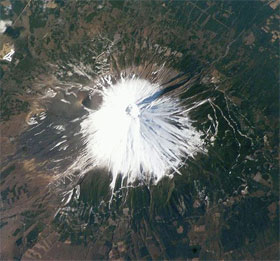Japan, China may be less affected by climate change
Japan, China may be less affected by climate change
mongabay.com
June 28, 2006
Temperature change in East Asian countries may be less significant than in countries bordering the North Atlantic, such as America and Great Britain, according to new research led by scientists at Newcastle University.
Researchers examined pollen samples take from a Japanese lake sediment core and found moderate changes in temperature and precipitation during the period from 16,000 years ago to 10,000 years ago, a time that experienced climate change similar to what we expect in the near future.
The pollen data showed that temperatures only fluctuated slightly during a cold surge 12,000 years ago. Whereas the North Atlantic experienced a seven to 10 degrees centigrade decrease in temperatures during the same event due to destabilization of the Gulf Stream caused by melting of polar ice, Japan saw only an estimated 5 degrees centigrade decrease in winter and no more than three degrees centigrade decrease in summer.
The results suggest that East Asia reacted differently to global warming 12,000 years ago. Researchers speculate that the Asian monsoon front may act as a barrier from the effect of North Atlantic cooling, which threatens other parts of the world with extreme climate change. Japan and lands east of the monsoon barrier could be spared the most drastic consequences.
“The research suggests Asia will not be as severely affected by the destabilizing of the Gulf stream as countries bordering the Northern Atlantic,” said Dr Takeshi Nakagawa, a palaeoclimatologist with Newcastle University’s School of Geography, Politics and Sociology. “The cooling effect will be more gradual than abrupt.”

Satellite image of Mt. Fuji in Japan. Courtesy of NASA/JPL.
|
Nakagawa said that more moderate climate change in Asia would be good for agriculture in the region.
“Economically this means that the crop in East Asia will be safe because changes in crop growing season, which is spring to summer, will be relatively minor.
But he warns that Asia should not be complacent about future climate change.
“This doesn’t mean that Asia can sit back, enjoy life and not take any responsibility for global warming. We should all be considering on how we can reduce the detrimental impact of human activity on the world as a whole which may be contributing to climate change.”
Related articles
Change in Atlantic circulation could plunge Europe into cold winters
The Atlantic Ocean circulation that carries warm waters north and returns cold waters south is slowing, putting Europe at risk of colder temperatures, according to research published in Nature. The Atlantic Heat Conveyor, the system of currents in the Atlantic Ocean that result in a net transport of warm water into the northern hemisphere, keeps western Europe warmer than regions at similar latitudes in other parts of the world. A weakening of the system, which includes the Gulf Stream, could cause a cooling in northwest Europe.
45% chance Gulf Stream current will collapse by 2100 finds research
New research indicates there is a 45 percent chance that the thermohaline circulation in the North Atlantic Ocean could shut down by the end of the century if nothing is done to slow greenhouse gas emissions. Even with immediate climate policy action, say scientists, there would still be a 25 percent probability of a collapse of the system of currents that keep western Europe warmer than regions at similar latitudes in other parts of the world. The Atlantic thermohaline circulation, better known as the Atlantic heat conveyor belt, is a system of currents in the Atlantic Ocean that result in a net transport of warm water into the northern hemisphere. A weakening of the system, which includes the Gulf Stream, could cause a cooling in northwest Europe and worsen droughts in equatorial Africa.
China’s glaciers shrinking by 7 percent per year
The glaciers of China’s Qinghai-Tibet plateau are shrinking by 7 percent a year due to global warming according to a report from Xinhua, the state news agency of China. In an interview with the agency, Professor Dong Guangrong with the Chinese Academy of Sciences warned that melting glaciers could turn parts of Tibet into desert, worsening droughts and increasing the incidence of sandstorms that regularly blast Chinese cities. He based his conclusions based on analysis of 40 years’ worth of data from China’s weather stations.







